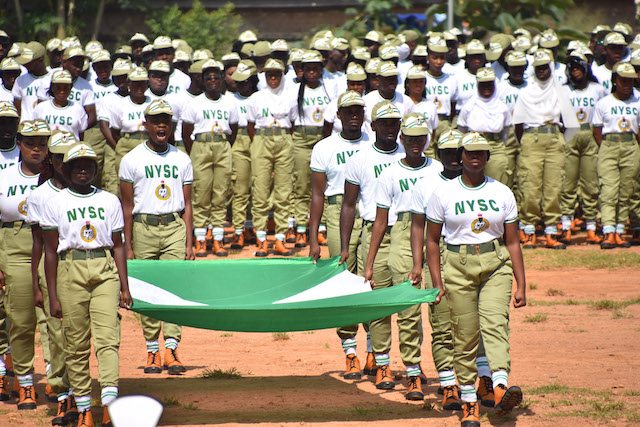There have been conflicting responses to a court ruling that allowed female National Youth Service Corps (NYSC) members to wear skirts for religious purposes. While some have hailed the decision as a victory for women’s rights, others have warned of policy slippage.
According to our correspondent, on June 13, Justice Hauwa Yilwa ruled that the NYSC policy requiring only female corps members to wear pants was a violation of the constitutional rights to human dignity and freedom of religion.
In particular, she affirmed that women in the corps should be permitted to wear skirts if they do so for really religious reasons.
Mrs. Juliet Ogunsaya, who claimed to have served in Enugu state, told NAN that she thought the ruling was fascinating and praised the plaintiffs’ bravery.
“I think the case and ruling are fascinating, and I’m happy the plaintiffs prevailed. I like how brave they were to challenge the NYSC.
“In particular, because they have allegedly been humiliated, embarrassed, and harassed.” I think the NYSC should no longer be required, but rather optional for individuals who wish to participate, since it has outlived its initial purpose.
The paramilitary nature of the plan, however, makes it crucial to wear the proper uniform to avoid it turning into a free-for-all.
Conversely, she remarked, “I wonder how the women of my era would have handled the physical activities, such as scaling a rope line while wearing skirts.”
StellaMaris Akubuike also voiced concerns about the ruling, citing sections of the act that created the NYSC.
I find the ruling unsatisfactory because the NYSC’s establishment and dress code are supported by law.
As the NYSC is a paramilitary organization, it is important to follow their dress code rather than breaking the law.
“How is it expected to go mountaineering, similar to our days at Agwu camp, the early morning workout, the rope climbing activities of Man ‘O’ War, or even the match pass on skirt?
It is nearly impossible, she continued, unless one has chosen to abstain from all camp activities, which also goes against NYSC’s mission.
“There were always consequences for disobeying a law,” she added, adding that the girls’ humiliation was terrible.
Despite my opposition to the girls’ humiliation, they encouraged it by breaking the law in the first place.
When you arrived to camp, you ought to have been aware of what to expect and followed it.
Even the religious faith they are defending does not tolerate disobedience, she remarked, adding that obedience is always preferable than sacrifice.
Since the program is paramilitary in nature, Mr. Monday Ijeh believes it would be abusive to require a woman to engage in it while wearing a skirt because it won’t protect her from the weather.
Regarding the forthcoming NYSC clothing code, Mr. Dominic Bassey is worried that the ruling may cause a great deal of misunderstanding.
Allowing several consistent possibilities could cause the scheme’s cohesiveness to break down.
“If skirts are permitted today for religious reasons, what if another group decides that their tradition forbids skirts but permits the tying of wrappers instead?” The plaintiffs’ bravery is admirable, but I believe the NYSC needs a complete revamp of the entire plan, not just the uniform.
He claimed that the ruling marked a sea change in Nigerian law and that it demonstrated a growing harmony between the defense of individual religious and human rights and institutional standardized policy.
He stated that it will take time to determine how the NYSC will carry out the ruling and whether comparable issues will surface in other government agencies.
Our correspondent writes that the NYSC’s decision to forbid female corps members from wearing skirts in accordance of their religious beliefs was ruled unlawful and a violation of fundamental rights to freedom of religion by the Federal High Court in Abuja in a June 13 ruling.
In her ruling, Justice Yilwa ruled that the NYSC had infringed upon the Constitution’s guarantees of human dignity and freedom of religion by requiring women to wear trousers as the only permissible uniform.
Miss Blessing Ogunjobi and Miss Vivian Ayuba, two former corps members, filed the lawsuits independently; but, because of their legal similarities, they were consolidated.
In the lawsuits designated FHC/ABJ/CS/989/2020 and FHC/ABJ/CS/988/2020, respectively, the applicants invoked Deuteronomy 22:5 to argue that being forced to wear pants was against their Christian beliefs.
In their interpretation, the scripture prohibited women from dressing in men’s clothing.
The NYSC’s insistence on pants violated the applicants’ right to express their faith, according to the court, citing Section 38(1) of the 1999 Constitution (as amended).
The court ruled that it also exposed them to degrading treatment and excessive harassment.
All of the applicants’ requests for relief were granted by Justice Yilwa, who also gave the same rulings in both cases: “A declaration that the refusal to allow skirts for religious purposes is invalid.”
The NYSC is required to acknowledge and allow skirts for female corps members who have legitimate religious objections.
The NYSC is required to recall the impacted former corps members and provide certificates to each of them in accordance with the mandate.
Additionally, the court declared that the applicants’ fundamental right to freedom of religion and freedom to practice it was clearly violated by the harassment, humiliation, and embarrassment they endured at the hands of the respondents’ agents.
For each applicant’s fundamental rights being violated, the judge granted them ₦500,000 in damages.
Despite the fact that each applicant sought ₦10 million in damages, the court deemed the ₦500,000 award to be sufficient under the circumstances.
As to the ruling, it was considered religious discrimination to deny the applicants a chance to finish their duty because of their clothing.
As a result of the responses’ actions, the applicants felt humiliated and ashamed.
“Their fundamental rights are being flagrantly violated,” declared Justice Yilwa.
In their individual lawsuits, the applicants sought enforcement of their fundamental rights to freedom of religion, which they said the NYSC had breached.
Read Also: FG to Launch State‑by‑State Homeownership Campaign in Renewed Hope Housing Drive
FHC/ABJ/CS/989/2020 and FHC/ABJ/CS/988/2020 list NYSC and the NYSC Director-General as respondents.
Order 11 Rules 1, 2, 3, 4, and 5 of the Fundamental Rights (Enforcement Procedure) Rules 2009, as well as Sections 38 and 42 of the 1999 Constitution (as amended), were the grounds for their application.
Under the court’s inherent jurisdiction, as well as in accordance with Articles 2, 5, 6, 8, 10, 17, and 19 of the African Charter on Human and Peoples’ Rights, the following reliefs were sought: “A declaration of the court that the refusal of the respondent to recognize and allow skirts as part of the NYSC uniform is a breach of the applicant’s right as contained in Section 38(1) of 1999 Constitution (as Amended), as well as Deuteronomy 22 vs. 5 of the Bible and a misreading of 2 Schedule Article 1 (I)(a) of the NYSC Bye Rules 1993.”
Section 38(1) of the 1999 Constitution (as amended) guarantees the applicant’s freedom of religion and the freedom to express that freedom in practice and observance. The court has declared that the applicant’s usage of skirts in the NYSC scheme is part of that freedom.
A declaration that the applicant’s fundamental rights to freedom of religion and freedom to practice it, as well as the right to human dignity and degrading treatment, were all flagrantly violated by the harassment, embarrassment, and humiliation that the applicant endured at the hands of the respondents’ agents.
The court’s order requires the respondents, their servants, agents, privies, or anyone else called to recognize, permit, and provide skirt for the applicant or any female who wishes to use it in accordance with Deuteronomy 22:5 and Section 38(1) of the 1999 Constitution (as amended). The damages amount to N10 million, and the court may issue additional orders based on the circumstances.



